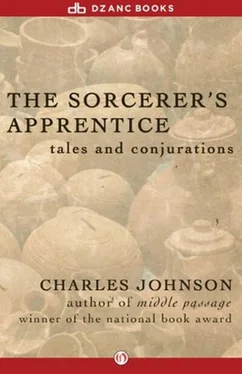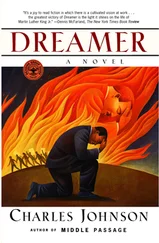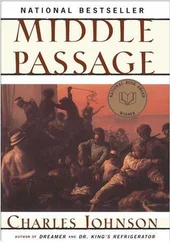“I can only be what I’ve been?” This he asked softly, but his voice trembled. “Only what I was in Hodges?”
“You can’t be Chinese.”
“I don’t want to be Chinese!” The thought made Rudolph smile and shake his head. Because she did not understand, and because he was tired of talking, Rudolph stepped back a few feet from her, stretching again, always stretching. “I only want to be what I can be, which isn’t the greatest fighter in the world, only the fighter I can be. Lord knows, I’ll probably get creamed in the tournament this Saturday.” He added, before she could reply, “Doug asked me if I’d like to compete this weekend in full-contact matches with some people from the kwoon. I have to.” He opened the screen door. “I will.”
“You’ll be killed — you know that, Rudolph.” She dug her fingernails into her bathrobe, and dug this into him: “You know, you never were very strong. Six months ago you couldn’t open a pickle jar for me.”
He did not seem to hear her. “I bought a ticket for you.” He held the screen door open, waiting for her to come inside. “I’ll fight better if you’re there.”
She spent the better part of that week at Shelberdine’s mornings and Reverend Merrill’s church evenings, rinsing her mouth with prayer, sitting most often alone in the front row so she would not have to hear Rudolph talking to himself from the musty basement as he pounded out bench presses, skipped rope for thirty minutes in the backyard, or shadowboxed in preparation for a fight made inevitable by his new muscles. She had married a fool, that was clear, and if he expected her to sit on a bench at the Kingdome while some equally stupid brute spilled the rest of his brains — probably not enough left now to fill a teaspoon — then he was wrong. How could he see the world as “perfect”?—That was his claim. There was poverty, unemployment, twenty-one children dying every minute, every day, every year from hunger and malnutrition, over twenty murdered in Atlanta; there were sixty thousand nuclear weapons in the world, which was dreadful, what with Seattle so close to Boeing; there were far-right Republicans in the White House: good reasons, Evelyn thought, to be “negative and life-denying,” as Rudolph would put it. It was almost sin to see harmony in an earthly hell, and in a fit of spleen she prayed God would dislocate his shoulder, do some minor damage to humble him, bring him home, and remind him that the body was vanity, a violation of every verse in the Bible. But Evelyn could not sustain her thoughts as long as he could. Not for more than a few seconds. Her mind never settled, never rested, and finally on Saturday morning, when she awoke on Shelberdine’s sofa, it would not stay away from the image of her Rudolph dead before hundreds of indifferent spectators, paramedics pounding on his chest, bursting his rib cage in an effort to keep him alive.
From Shelberdine’s house she called a taxi and, in the steady rain that northwesterners love, arrived at the Kingdome by noon. It’s over already, Evelyn thought, walking the circular stairs to her seat, clamping shut her wet umbrella. She heard cheers, booing, an Asian voice with an accent over a microphone. The tournament began at ten, which was enough time for her white belt husband to be in the emergency ward at Harborview Hospital by now, but she had to see. At first, as she stepped down to her seat through the crowd, she could only hear — her mind grappled for the word, then remembered — kiais, or “spirit shouts,” from the great floor of the stadium, many shouts, for contests were progressing in three rings simultaneously. It felt like a circus. It smelled like a locker room. Here two children stood toe to toe until one landed a front kick that sent the other child flying fifteen feet. There two lean-muscled female black belts were interlocked in a delicate ballet, like dance or a chess game, of continual motion. They had a kind of sense, these women — she noticed it immediately — a feel for space and their place in it. (Evelyn hated them immediately.) And in the farthest circle she saw, or rather felt, Rudolph, the oldest thing on the deck, who, sparring in the adult division, was squared off with another white belt, not a boy who might hurt him — the other man was middle-aged, graying, maybe only a few years younger than Rudolph — but they were sparring just the same.
Yet it was not truly him that Evelyn, sitting down, saw. Acoustics in the Kingdome whirlpooled the noise of the crowd, a rivering of voices that affected her, suddenly, like the pitch and roll of voices during service. It affected the way she watched Rudolph. She wondered: Who are these people? She caught her breath when, miscalculating his distance from his opponent, her husband stepped sideways into a roundhouse kick with lots of snap — she heard the cloth of his opponent’s gi crack like a gunshot when he threw the technique. She leaned forward, gripping the huge purse on her lap when Rudolph recovered and retreated from the killing to the neutral zone, and then, in a wide stance, rethought strategy. This was not the man she’d slept with for twenty years. Not her hypochondriac Rudolph who had to rest and run cold water on his wrists after walking from the front stairs to the fence to pick up the Seattle Times . She did not know him, perhaps had never known him, and now she never would, for the man on the floor, the man splashed with sweat, rising on the ball of his rear foot for a flying kick — was he so foolish he still thought he could fly? — would outlive her; he’d stand healthy and strong and think of her in a bubble, one hand on her headstone, and it was all right, she thought, weeping uncontrollably, it was all right that Rudolph would return home after visiting her wet grave, clean out her bedroom, the pillboxes and paperback books, and throw open her windows to let her sour, rotting smell escape, then move a younger woman’s things onto the floor space darkened by her color television, her porcelain chamber pot, her antique sewing machine. And then Evelyn was on her feet, unsure why, but the crowd had stood suddenly to clap, and Evelyn clapped, too, though for an instant she pounded her gloved hands together instinctively until her vision cleared, the momentary flash of retinal blindness giving way to a frame of her husband, the postman, twenty feet off the ground in a perfect flying kick that floored his opponent and made a Japanese judge who looked like Odd job shout “ippon”—one point — and the fighting in the farthest ring, in herself, perhaps in all the world, was over.
God willing, I’m going to tell you a love story. A skeptical old man, whose great forehead and gray forked beard most favor (when I flatter myself) those of that towering sociologist W. E. B. Du Bois, I am hardly a man to conjure a fabulation so odd in its transfiguration of things, so strange, so terrifying (thus it now seems to me) that it belongs on the pale lips of the poetic genius who wrote Essentials and that hallucinatory prose-poem called Cane . But even though I’m an old man (I know my faults: failing memory, an infernal Faustian leer), I can still tell a first-rate tale of romance.
The girl always came late to my evening seminar — Kant this semester — sashaying seductively, pulled into the room by rental-library books held close to her chest, clomping in black leather boots around the long table to sit, her brown knees pressed together, left of my lectern. When she first “appeared” to me, I believe I was stalking Kant, thumbs hooked in my vest, by way of a playful verse attributed to Bishop Berkeley:
There was a young man who felt God
Must find it exceedingly odd
Читать дальше












